TOTAL RECALL (1990)
When a man goes for a virtual vacation, memories of the planet Mars push him to go to the planet for real... or does he?
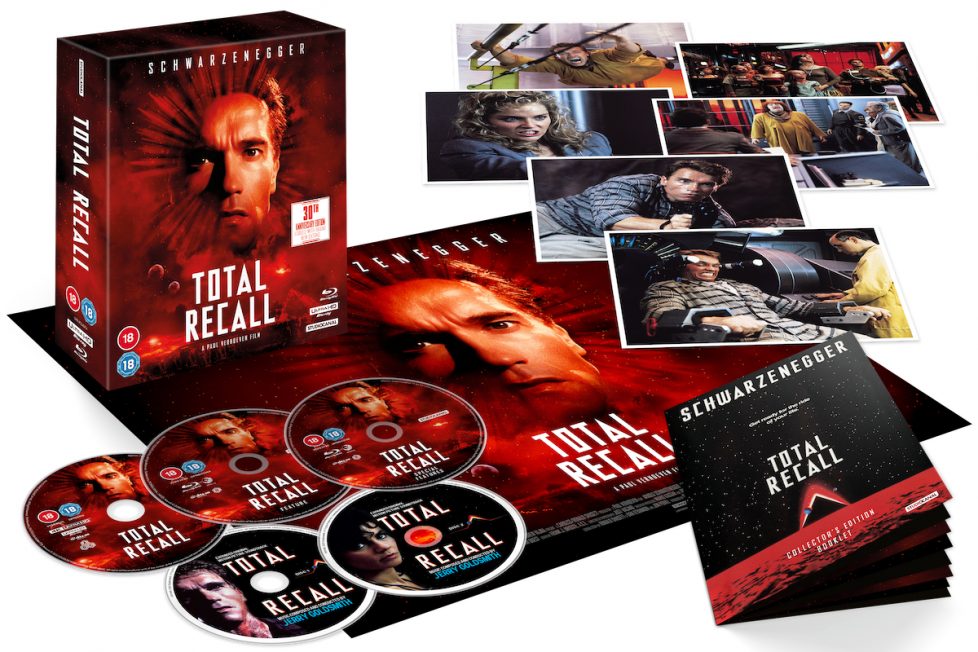
When a man goes for a virtual vacation, memories of the planet Mars push him to go to the planet for real... or does he?


Philip K. Dick’s short story “We Can Remember It for You Wholesale” took a long time to reach the screen. Starting life as a screenplay called Total Recall, written by Dan O’Bannon and Ronald Shusett before their success with Alien (1979), it got stuck in development hell during the 1980s. Ridley Scott, who directed Alien, famously went on to adapt another of the sci-fi author’s tales, “Do Androids Dream of Electric Sheep?”, which resulted in the box office dud Blade Runner (1982). But as that cyberpunk classic started to get reappraised on home video, Total Recall‘s path to the multiplexes inched along through 40 different drafts.
Dino De Laurentiis wanted to make Total Recall with Richard Dreyfuss (Jaws) or Patrick Swayze (Dirty Dancing) as the hero, then David Cronenberg (Videodrome) spent a year helping write a version closer to the source material, intended to star William Hurt. But this went against O’Bannon and Shusett’s desire to make a “Raiders of the Lost Ark Go to Mars” rip-roaring adventure, so they parted ways—although Cronenberg’s idea of mutants living on the Red Planet was retained.
After David Lynch’s Dune (1984) flopped in cinemas, De Laurentiis lost his enthusiasm for making a similarly expensive adaptation of a renowned sci-fi author’s work. And once De Laurentiis Entertainment Group collapsed in 1989, Carolco was persuaded to buy the rights to Total Recall for $3M by Arnold Schwarzenegger. The Austrian actor was a hot commodity in Hollywood after The Terminator (1984) led to a string of hits, so his star-power lifted the project’s fortunes and attracted more financing. Arnie negotiated a $10M salary and 15% of any profits, together with power of veto over fundamental production hires, before asking Paul Verhoeven to direct because he loved his recent work on RoboCop (1987).
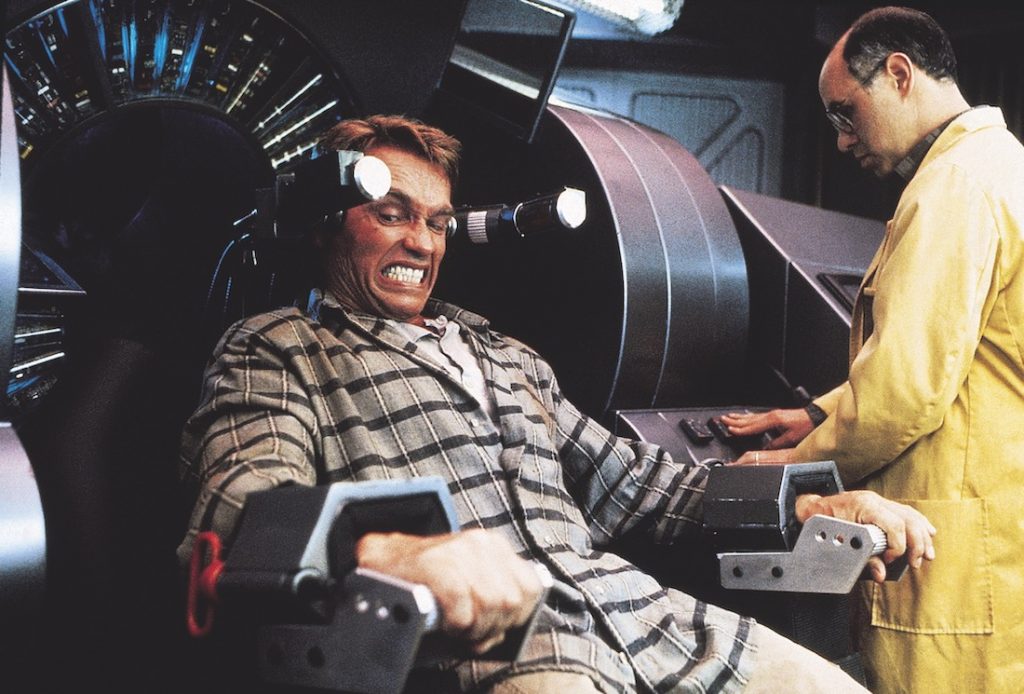
Total Recall is often cited as the second of Verhoeven’s Hollywood sci-fi trilogy, but only if one ignores Hollow Man (2000), nestled between influential hits like RoboCop and Starship Troopers (1997). It may lack the biting satire of those, but there’s a lot of direct crossover with RoboCop creatively, as Verhoeven recruited the same cinematographer (Jost Vacano), production designer (William Sandell), editor (Frank J. Urioste), and SFX designer (Rob Bottin). He even cast Ronny Cox as another villain, effectively reprising corporate scumbag Dick Jones.
In 2084, Douglas Quaid (Schwarzenegger) is a construction worker having recurring dreams about being on Mars with a beautiful brunette (Rachel Ticotin), despite having never been there in real life. He’s married to beautiful blonde Lori (Sharon Stone) and seems to have a good life on Earth working in a quarry, but a strange compulsion to go off-world leads him to a company called Rekall. Their business involved implanting false memories of vacations for less money than a real trip would cost, so Quaid chooses a trip to Mars as a secret agent to make his dreams come true. Unfortunately, Rekall’s implantation process going wrong (apparently because Quaid’s mind contains suppressed memories), and he’s forced to go on the run after his best-friend and wife are revealed to be handlers trying to keep his true identity a secret from himself.
The film would arguably make more sense without Schwarzenegger’s presence as the hero, as the original intention to have a milquetoast nobody who works in accounts discovery he’s a bad-ass secret agent would make for a better character arc. By casting Schwarzenegger, there’s never any doubt he’s a natural born hero, even if the script does manage to make audiences wonder if Quaid’s actually the villain towards the end. But beyond that quibble, Total Recall undoubtedly benefitted from having the world’s biggest action star join forces with a European maverick like Verhoeven. RoboCop boasted a fantastic script too, but this is the best screenplay the Dutch filmmaker ever got his hands on in Hollywood because the story’s deceptively simple but has so many twists and turns. It was also ahead of its time, as Hollywood didn’t continue exploring high-concept stories about ordinary people discovering a shocking truth about their existence until the end of the decade, with The Game (1997), The Truman Show (1998), and The Matrix (1999), amongst others.
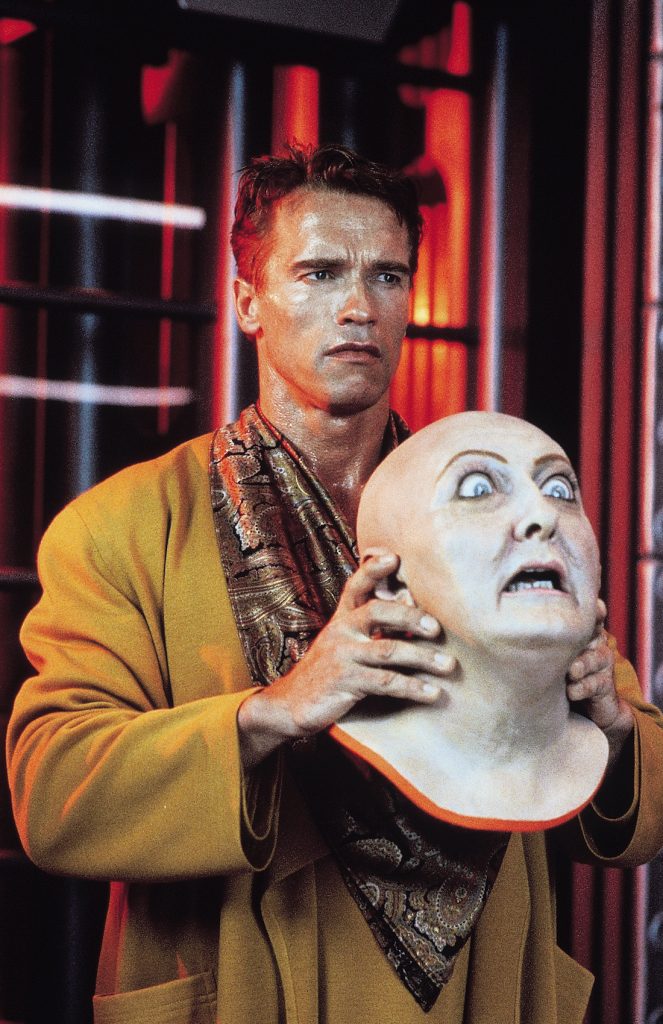
The great thing about Total Recall is that it works on two levels of entertainment: there’s the thrill of a macho 1980s sci-fi action-adventure movie with Schwarzenegger making deadpan quips (“consider that a divorce”), but it’s anchored by Philip K. Dick’s deeper ideas about the slipperiness of memory and identity. It’s an adaptation that could’ve gone a hundred different ways (Cronenberg’s take would have been fascinating), but we ended up with a mega-expensive blockbuster-with-a-brain.
And if that sounds like a wasted opportunity for something subtler and more intellectual, the involvement of Verhoeven ensured the crowd-pleasing spectacle had bite and unforgettable visuals. It’s one of the most propulsive sci-fi stories of its era, being an extended chase from Earth to Mars, but one that never forgets to keep audiences mentally stimulated along the way. That also makes it one of Schwarzenegger’s best movies, even if it tends to be less remembered than the Terminator‘s and Predator (1987). And that’s only really because those launched enormous franchises and Total Recall was a standalone deal. (Let’s forget the 2012 remake ever happened.)
On a personal level, one of the delightful things about Total Recall is that I never accurately remember where the story goes each time I watch it. Ironically, it’s like my memory evaporates away between viewings, which means I’m always pulled through the story and it’s never felt entirely predictable. And there’s always the fun possibility that everything we do see really was a false memory (we just never see Quaid waking up back at Rekall post-credits), or that he made a bad decision and is now trapped in a dream (presumably comatose in the real-world after a botched experience). I forget how ambiguous Total Recall is because its wrinkles never stood out to me when I first saw it as a teenager.
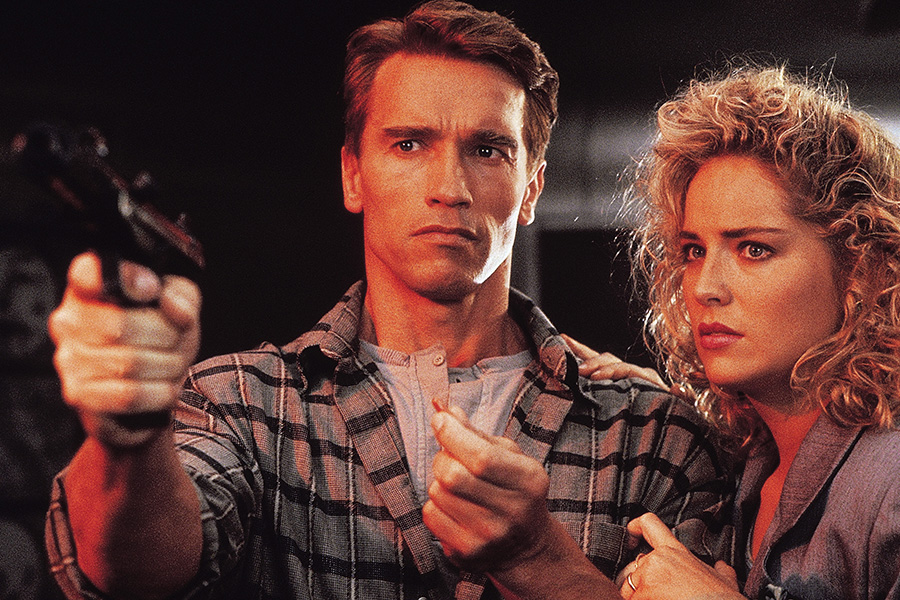
While lacking the ultra-violence of RoboCop, Verhoeven didn’t smooth any of Total Recall‘s edges. This is mostly evident with the eye-popping SFX work of Rob Bottin (the genius behind The Howling and The Thing), who received a ‘Special Achievement Academy Award’ for the cutting-edge visual effects work here. The realism of Bottin’s animatronic heads, mostly used to portray people suffering from increased gravity and lack of air on the surface of Mars, are exemplary. They’re unsettling and slightly cartoonish with their bug-out eyes, but it gives them a strange appeal compared to what CGI would more easily achieve today. There are certainly a few sequences that have dated (the fake Schwarzenegger when he removes the false head of a large woman he’s pretending to be is now blindingly obvious), but for the most part the practical effects hold up well. And when they don’t, there’s a charm and fascination about how they were done without computers. Arriving shortly before the CGI revolution took over Hollywood with Terminator 2: Judgment Day (1991), this was one of the last great triumphs for miniatures, matte paintings, and make-up.
The performance are all good, even with Schwarzenegger’s obvious limitations as an actor. He’s always best in roles where his narrow range is an asset, meaning automatons, quiet brutes, or amnesiacs play best. Arnie was peaking in the early-’90s and was clearly in full control of what he could bring to projects in terms of charisma and physicality. And to be fair, he’s also not bad in scenes where he plays a confident asshole version of himself.
But while Schwarzenegger dominates this film, there still room for a talented mix of supporting players to have fun around the edges. Sharon Stone had been appearing in smaller roles throughout the 1980s, like Police Academy 4: Citizens on Patrol (1987) and Above the Law (1988), but she leaves arguably the best impression here as femme fatale Lori. Verhoeven clearly saw something in Stone’s mix of bombshell beauty and icy resolve, as he reunited with her on Basic Instinct (1992) next and gave the world a new feminine icon.
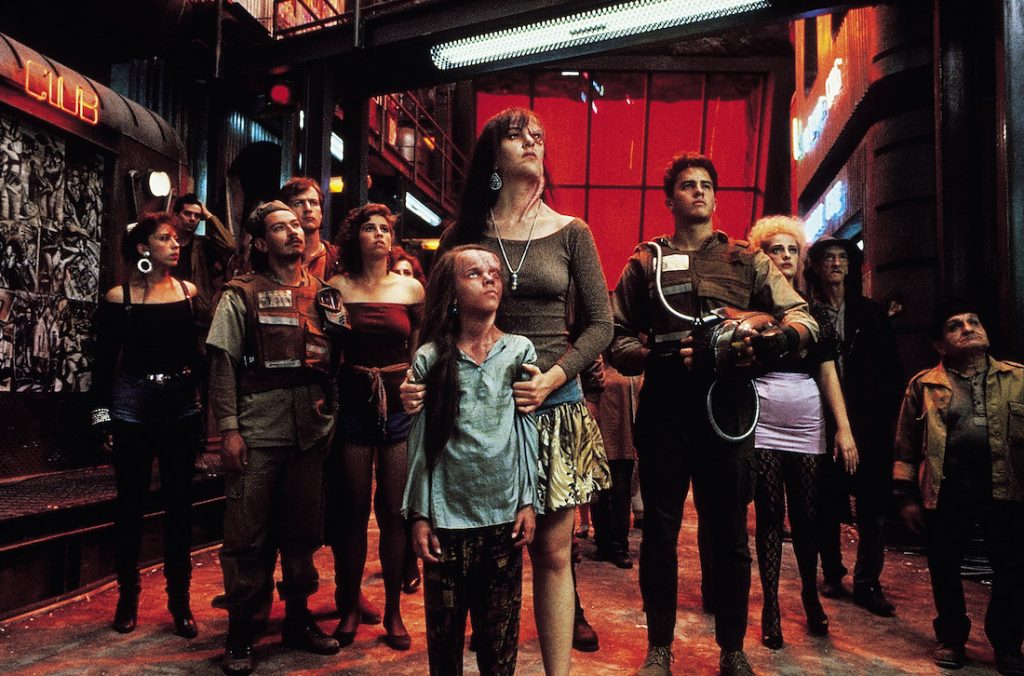
Ronny Cox is great value as Cohaagen, the governor of Mars fighting a mutant rebellion in the streets, even if the character’s a loose imitation of his RoboCop bad guy with different hair. Michael Ironside has more fun as henchman Richter, although it’s a shame hints of some depth aren’t fully explored—like when Lori is revealed to be his wife, deep undercover. Again, Verhoeven must have enjoyed Ironside’s brand of stone-faced machismo because he was rehired for Starship Troopers. Rachel Ticotin rounds off the key players as the mysterious Melina, the girl from Quaid’s dreams who turns out to be a real stripper in a Martian bar filled with mutants (including the infamous three-breasted woman). Her role’s a little undercooked given its dramatic potential, which is a shame because she becomes Quaid’s love-interest once Stone departs the film towards the end. But it’s a small misstep in the big scheme of things.
The design of the future is also memorable, even if everything now looks a bit dated with so many ’80s vibes to the tech. There are flatscreens that can simulate the outside world, but most places have chunky CRT televisions and intercoms. Vehicles are of angular design with gull-wing doors and the architecture is mostly concrete buildings. A lot of the locations were found in Mexico City at the Estudios Churubusco studios. It works well and there are still some ideas that look suitably futuristic in Total Recall, like Lori’s holographic tennis coach or the security screen that displays real-time skeletons of people walking through. A lot of the gadgets have a slightly worn feel that helps, like the technology’s advanced but it’s been allowed to stagnate for a few decades and things are now a little glitchy. Or maybe believing that makes it easier to excuse the weird lip movements of the robot Johnny Cab!
Overall, Total Recall is a highlight of Verhoeven’s Hollywood career and a key part of Arnold Schwarzenegger’s heyday, even if the film’s technical achievement were quickly overtaken by the coming digital age. But the ideas are evergreen thanks to Philip K. Dick’s amazing concept, Verhoeven brings real personality to proceedings that prevent it becoming a generic chase movie, Jerry Goldsmith’s score is an undervalued gem, and Rob Bottin’s work was the apex of analogue SFX before Jurassic Park (1993) changed the game forever.
USA • MEXICO | 1990 | 113 MINUTES | 1.85:1 | COLOUR | ENGLISH

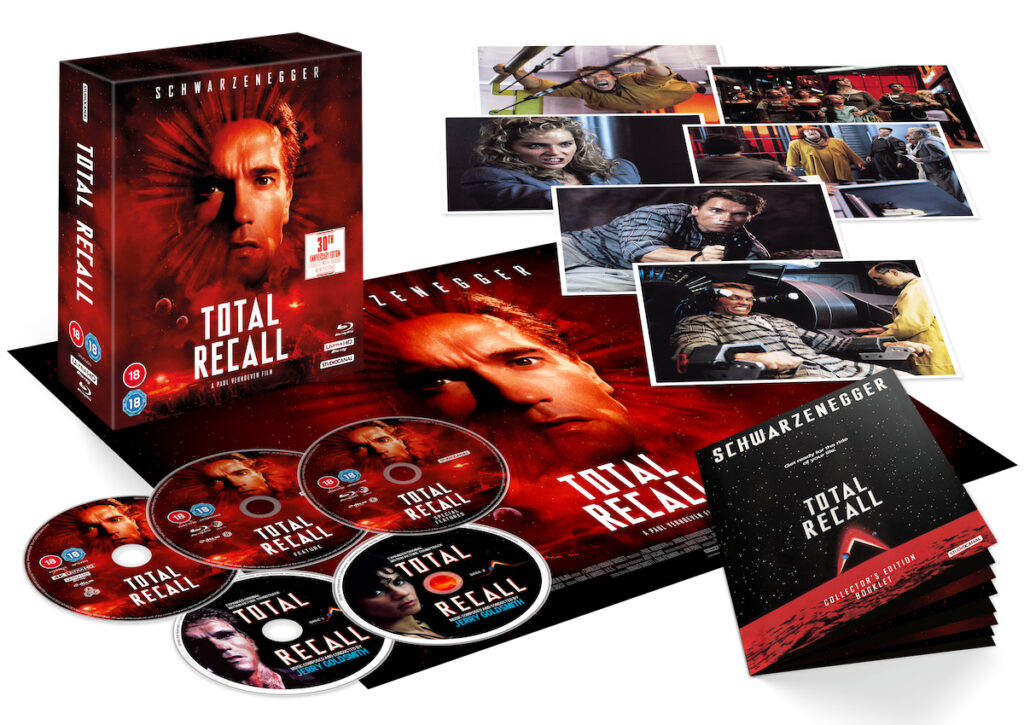
StudioCanal are doing a sterling job bringing mainstream 1980s and 1990s classics to 4K Ultra HD, and Total Recall is another excellent release from them. The image is rich and stable, although perhaps a little soft, but detail levels are a noticeable upgrade over the previous 2012 Blu-ray. Some of the SFX look more fake than ever thanks to the extra clarity (like some bad greenscreen on Mars), but the colours and detailing makes up for that. It’s not pin-sharp as a modern movie shot digitally would be, but this 4K restoration of the original 35mm camera negatives will impress its fans.
Even better, we now have a Dolby Atmos soundtrack that gives Total Recall a bit of added punch in a few sequences. It doesn’t make much use of the height channels, to my ear, and the rear speakers aren’t kept busy throughout, but it’s a pleasant experience with good bass and clear dialogue. While only a mild improvement over the previous DTS-HD Master Audio mix, but it does sound more expansive.
This 30th Anniversary ‘Collector’s Edition’ of Total Recall comes with the 4K Ultra HD disc containing the film and some bonus material, 1x Blu-ray containing the film in 1080p with a few of the same extras, 1x Blu-ray containing more extras features previously available on the 2012 release, and Jerry Goldsmith’s original soundtrack on CD (exclusively). There are also six art cards, a 48-page booklet, and a double-sided poster. I only have the 4K disc for review, but also own what’s on the 2012 Blu-ray’s extras.

director: Paul Verhoeven.
writers: Ronald Shusett, Dan O’Bannon & Gary Goldman (story by Ronald Shusett, Dan O’Bannon & Jon Povill; based on ‘We Can Remember It for You Wholesale’ by Philip K. Dick).
starring: Arnold Schwarzenegger, Rachel Ticotin, Sharon Stone, Michael Ironside, Ronny Cox, Mel Johnson Jr., Marshall Bell & Roy Brocksmith.
